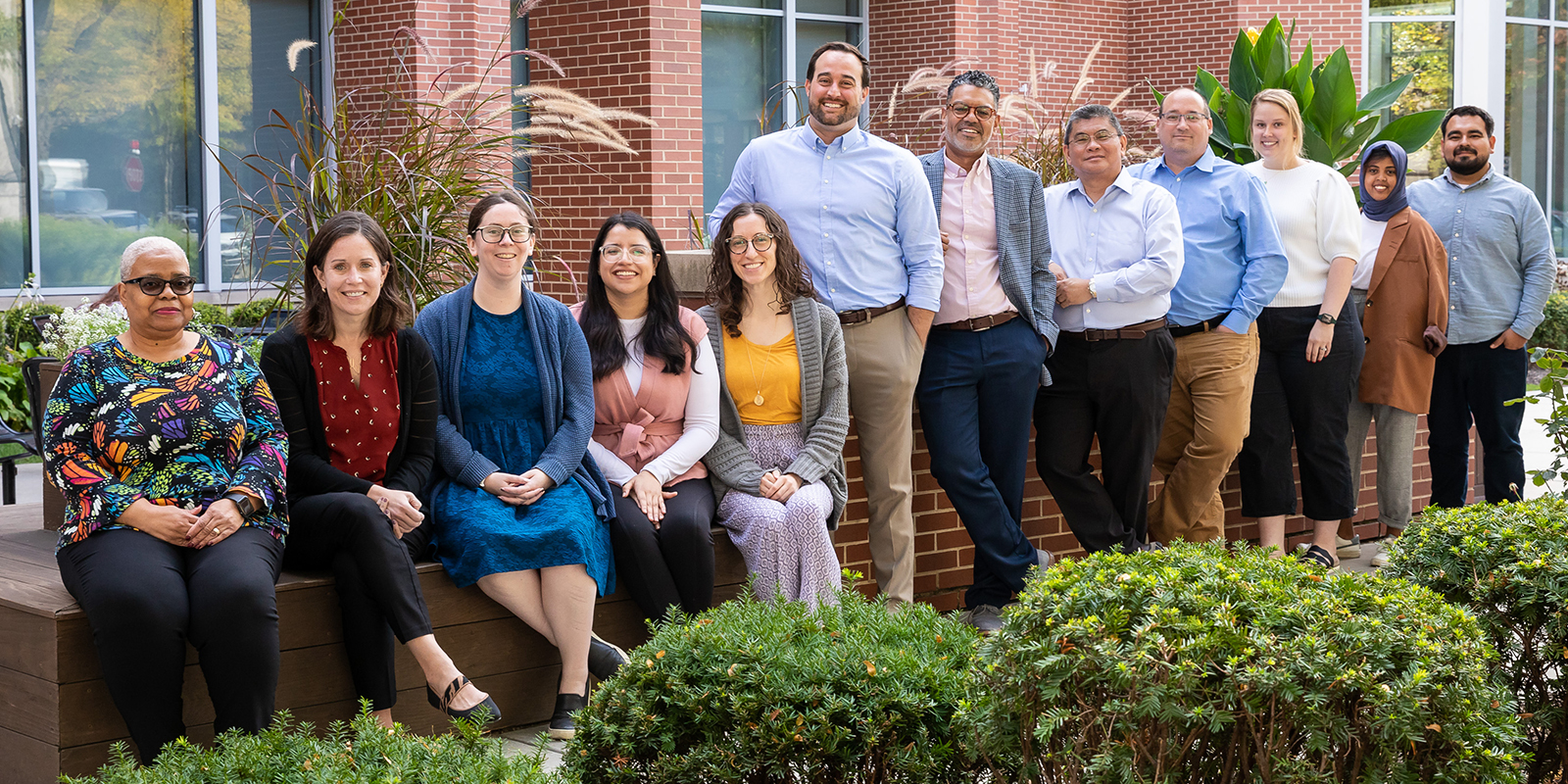
DePaul’s University Counseling and Psychological Services is here to help students with a staff of 10 clinicians and new services. (Left to right) Natalyn Williams, Meghann Hennelly, Maggie Brennan, Judith Legorreta-Hernandez, Alice Wasylowsky, J.D. Dragna, Orson Morrison, Tow Yau, Anthony McGeath, Victoria Smith, Halimo Abdulkarim, Enrique Silva. (DePaul University/Jeff Carrion)To speak directly to a therapist 24 hours a day, seven days a week, students can call (773) 325-CARE (2273) and Press "1" when prompted. For more resources, visit
the UCAPS website
.
Among the new faces on campus this year are the welcoming ones of the University Counseling and Psychological Services staff.
Under the direction of Tow Yau, the staff has 10 clinicians, including licensed mental health professionals in psychology, counseling, social work and psychiatry.
“We’ve had the opportunity to rebuild services in a way that better meets the needs of students,” says Yau, who joined DePaul last year.
In addition to new therapists, UCAPS has a new 24/7 phone number, (773)-325-2273, students can call to connect with a professional counselor in minutes. They also can request screening appointments online and counselors have weekly on-campus office hours where students can walk in for a consultation.
“With the growth in demand for mental health care over the last couple of years, it's very common to see clinics with lengthy waiting lists,” says Orson Morrison, the associate director for clinical services with UCAPS. “We wanted to create a system where students could get access whenever they need it.”
During these consultations, counselors talk to students to identify how they’re struggling and what services would best support them. That could be one-on-one sessions with a UCAPS therapist, a referral to an outside clinician, group therapy for a specific issue, or a combination of these services.
“It's not one size fits all. We really work to adapt to what the student needs,” says Alice Wasylowsky, a clinical psychologist who joined UCAPS this summer.
In her counseling sessions, Wasylowsky likes to integrate self-compassion and mindfulness practices. However, her focus is assisting students in identifying and achieving their goals.
“We see students as the experts on their own lives,” she says.
While there is no cap on the number of free individual therapy sessions, the counseling center is meant to serve short-term needs. For long-term treatment or more complex diagnoses, staff work with students to find the care they need.
New expertise and group therapy opportunities
The new counselors not only bring energy to the counseling center, but also diverse expertise and backgrounds. Halimo Abdulkarim and Maggie Brennan, both staff therapists, are trauma specialists and can work with students who have experienced sexual or relationship violence. They’re working with the Office of Gender Equity to support students who report sexual misconduct.
UCAPS hired a bilingual therapist, Judith Legorreta-Hernandez, as well as a certified alcohol and drug counselor, Anna Landmeier. Counseling services is also bringing back group therapy.
Wasylowsky is creating a support group for graduate students that meets on Thursday evenings. A weekly undergraduate support group meets on Tuesday evenings. Depending on student demands each quarter, group sessions could be added for mindfulness and meditation practices.
"These groups can be powerful because they help students not feel isolated or alone in their struggles," Morrison notes. He wants to encourage that sense of belonging in all the center’s work.
“We want students to feel like all of their multiple identities, their intersectional identities, their racial identity, their sexual orientation, their gender identities, all of those various parts of who they are, are valued and supported,” he says.
Morrison extends this perspective to the new approach for counseling services, a community-centered approach, where UCAPS is on campus engaging with students, faculty, staff and other partners. His message is simple: connect with us. UCAPS staff members are interested in presenting at or attending events across campus. Requests can be made
through this form .
Wasylowsky has a similar message for students.
"If you're curious, come see us. Even if you just want to come by and just ask about something, it's okay," she says. "We won’t turn you away.”